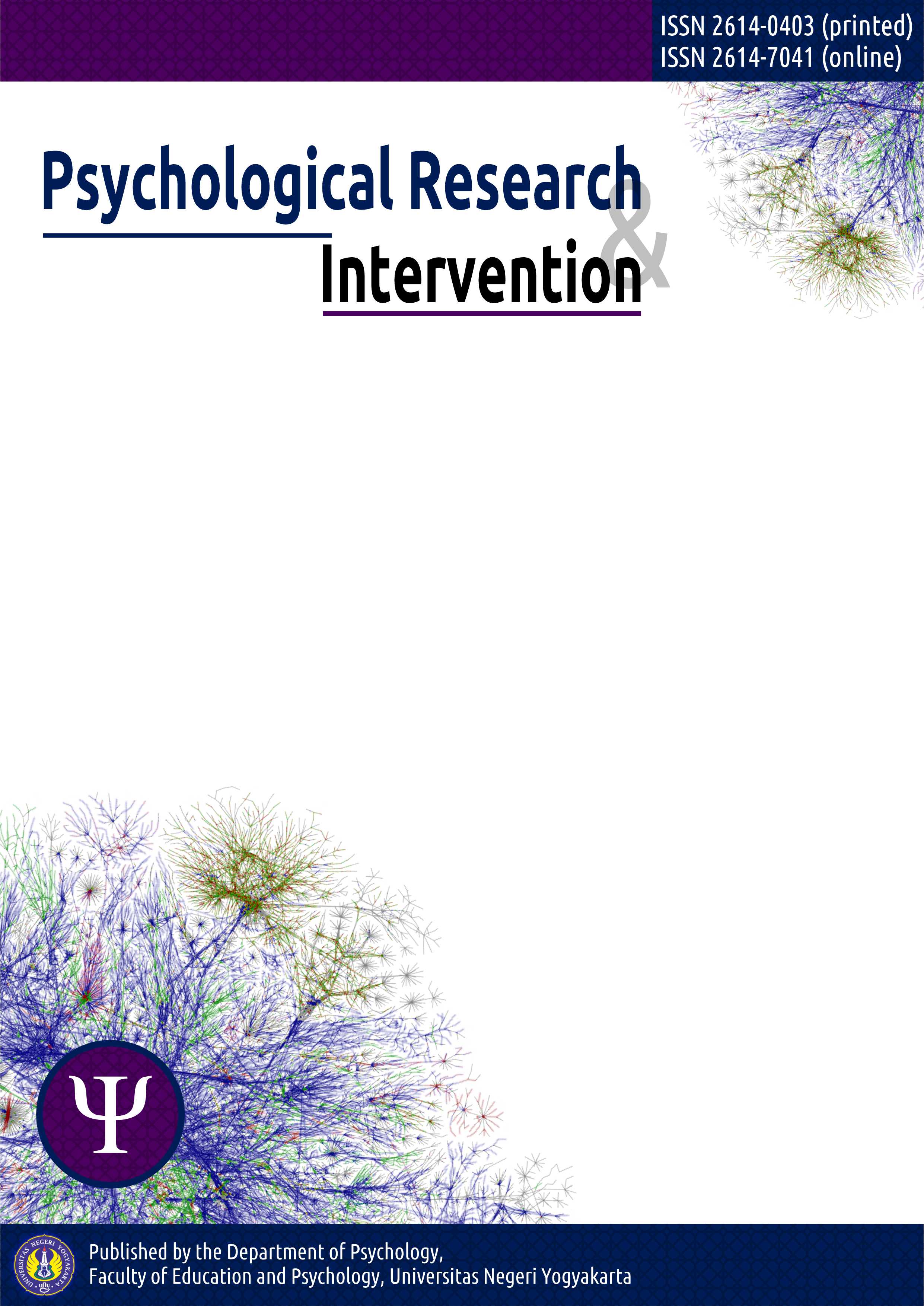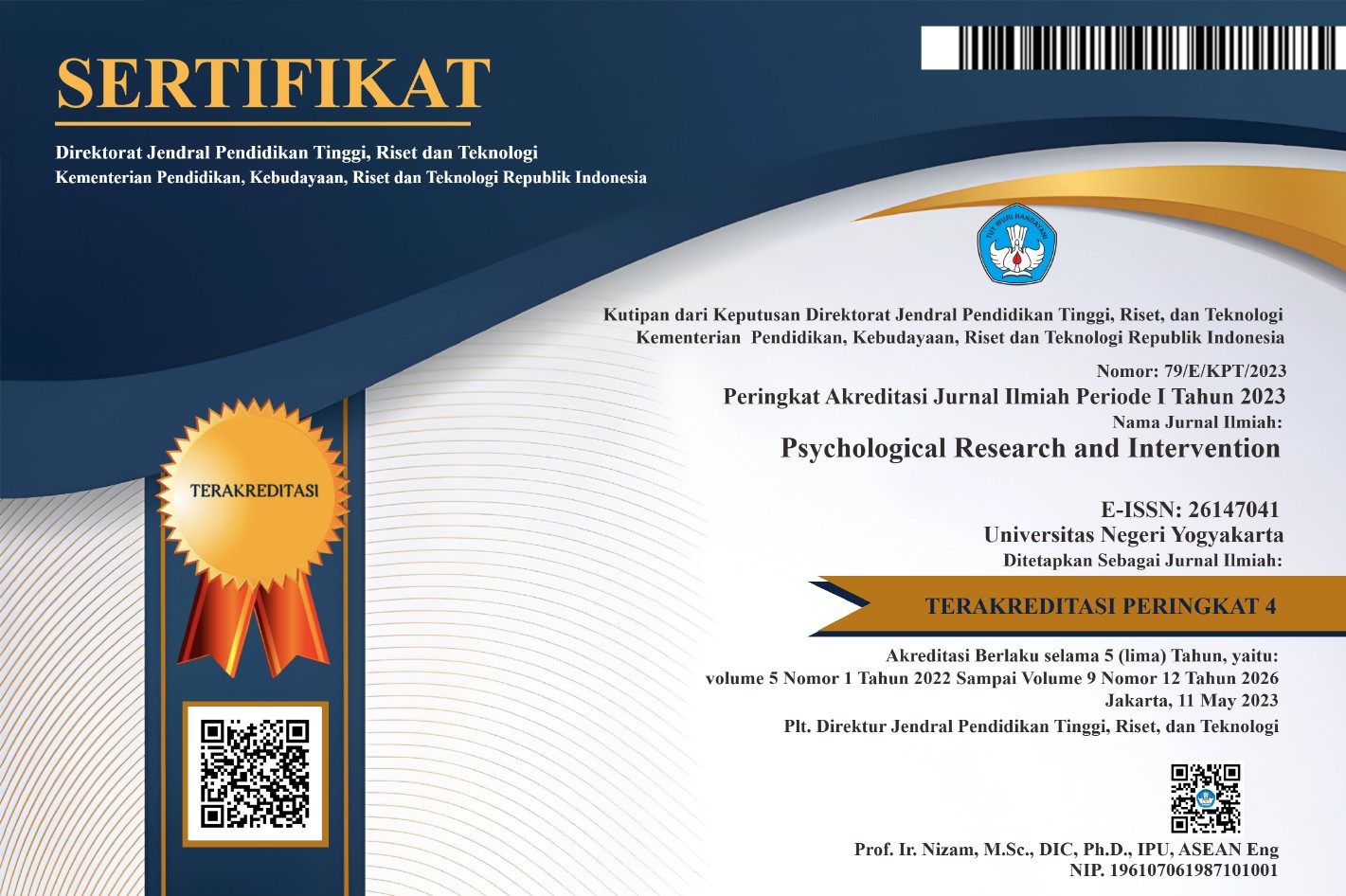Trial application of acceptance and commitment therapy principles to reduce the degree of stress experienced by adolescents with down syndrome sibling(s)
DOI:
https://doi.org/10.21831/pri.v2i1.24339Keywords:
Acceptance and Commitment Therapy (ACT), Derajat Stres, Fleksibilitas Psikologi, Remaja dengan Saudara Down SyndromeAbstract
This study was conducted to see whether the training module of the application of the principle of Acceptance and Commitment Therapy can be used as an intervention to reduce the stress degree of adolescents aged 14 – 16 who have Down Syndrome's sibling. The design of this research is quasi-experiment with One Group Pretest - Posttest Design method. The sample of the study were three adolescents aged 14 – 16 who had Down Syndrome's sibling, were obtained by purposive sampling technique. The measuring tool used in this study is the Stress Degrees questionnaire, based on stress theory by Lazarus and Folkman (1984), to measure the stress degree, and the Acceptance and Action Questionnaire II (AAQ-II) questionnaire to measure psychological flexibility, adapted into Indonesian from AAQ-II (Hayes, et al, 2004). The results showed that the application of the ACT principle significantly reduced the stress degree and increased the psychological flexibility of adolescents aged 14 – 16 who have Down Syndrome's sibling, with a significance value of 0.016 (sig <0.05). Through the application of ACT principles, the subjects's psychological flexibility is increased so that the subjects know how to deal with problems, by accepting negative or unpleasant feelings and thoughts because of having Down Syndrome's sibling and having a commitment to achieve goals according with their value of life.
References
Agochiya, D. 2002. Every Trainer's Handbook. Los Angeles: Sage.
American Psychiatry Association. (2013). Diagnostic and Statistical Manual of Mental Disorder (Fifth Edition ed.). Washington: American Psychiatric Publishing.
American Psychological Association. 2002. A Reference for Professionals: Developing Adolescents. Washington: American Psychological Association.
Arch, J., Craske, M.G. 2008. Acceptance and Commitment Therapy and Cognitive Behavioral Therapy for Anxiety Disorders: Different Treatments, Similar Mechanism? Clinical Psychology: Science and Practice Vol. 15 No. 4, 264-279.
Armstrong, A.B., Morrison, K.L., Twohig,M.P. 2013. A Preliminary Investigation of Acceptance and Commitment Therapy for Adolescent Obsessive-Compulsive Disorder. Journal of Cognitive Psychoterapy: An International Quartely Vol. 27, No.2.
Barker, C., Pistrang, N., Elliot, R. 2002. Research Methods in Clinical Psychology 2nd Edition. USA: John Wiley & Sons.
Beirne-Smith, M., Patton, J., & Kim, S. (2006). Mental Retardation. New Jersey: Pearson Education.
Berk, L.E. 2008. Infants, Children, and Adolescents 6th Edition. New York: Pearson.
Bond, F.W. 2011. Preliminary Psychometric Properties of Acceptance and Action Questionnaire II: A Revised Measure of Psychological Inflexibility and Experiental Avoidance. Behavior Therapy, Vol. 42, 676-688.
Breakwell, G.M., Smith, J.A., Wright, D.B. 2012. Research Methods in Psychology 4th Edition. London: SAGE Publication Ltd.
Budman, S.H., Gurman, A.S 1988. Theory and Practice of Brief Therapy. USA: The Guilford Press.
Christensen, L.B. 2007. Experimental Methodology 10th Edition. New York: Pearson Education, Inc.
Cuskelly, M., Hauser-Cram, P., Riper, M.V.2010. Families of Children With Down Syndrome: What We Know And What We Need To Know. Down Syndrome Research and Practice, pg. 105-113, doi: 103104/reviews2079.
Dahl, Joanne C, et.al. 2009. The Art & Science of Valuing in Psychotherapy Helpong Clients Discover, Explore, and Commit to Valued Action Using Acceptance Commitment Therapy. Oakland: New Harbinger Publication.
Fink, G. 2000. Encyclopedia of stress (Vol.1-3). San Diego: Academic Press.
Fledderus, M., Bohlmeiher, E.T., Smit. F., Westerhof. G.J. 2010. Mental Health Promotion as a New Goal in Public Mental Health Care: A Randomized Controlled Trial of an Intervention Enhancing Psychological Flexibility. American Journal of Public Health, Vol. 100, No. 12, 2372-2378.
Fletcher, L., Hayes, S.C. 2005. Relational Frame Theory, Acceptance, and Commitment Therapy, and A Functional Analytic Definition of Mindfulness. Journal of Public Health, 100. 12. 23722378.
Friedenberg, Lisa. 1995. Psychological Testing, Design, Analysis, and Use. USA: Allyn and Bacon.
Glesne, Corrine. 2011. Becoming Qualitative Researchers: An Introduction 4th Edition. Boston: Pearson.
Graziano, Anthony & Raulin, M.L. 2000. Research Method: A Process of Inquiry 4th Edition. New York: Addison Wesley Educational Publisher Inc. Higgins.
Hallahan, D.P., Kaufman, J.M., & Pullen, P.C. 2009. Exceptional Learners: An Introduction to Special Education. USA: Pearson Education.
Harris, Russell. 2009. Acceptance and Commitment Therapy Training. Retrieved from http://www.actmindfully.com.au/acceptance_&_commitment_therapy pada Desember 2016.
Harris, Russell. 2016. Embracing Your Demons: An Overview of Acceptance and Commitment Therapy. Journal of Psychoterapy In Australia, Vol. 12, 4, 2-8.
Hayes, S.C., et.al. 1999. Acceptance Commitment Therapy: An Experimental Approach to Behavior Change. New York: The Guilford Press.
Hayes, S.C., Strosahl, K.D. 2004. What is Acceptance and Commitment Therapy. Dalam "A Practical Guide to Acceptance and Commitment Therapy" Selected Reading hlm 3 – 29. New York: Springer.
Hayes, S.C. 2005. Get Out of Your Mind and Into Your Life: The New Acceptance and Commitment Therapy. Oakland: New Harbiger Publication, Inc.
Hayes, S.C., et.al. 2006. Acceptance and Commitment Therapy: Model, Process, and Outcomes. USA: Psychology Faculty Publication.
Kohls, L.R., Brussow, H.L., 1995. Training Know How for Cross Cultural and Diversity Trainers. San Fransisco: Adult Learning Systems.
Lazarus, R., Folkman, S. 1984. Stress, Appraisal, and Coping. New York: Springer Publishing Company.
Lazarus, R.S. 1999. Stress and Emotion: A New Synthesis. New York: Springer.
Mangunson, F. 2009. Psikologi dan Pendidikan Anak Berkebutuhan Khusus. Depok: LPSP3 Fakultas Psikologi Universitas Indonesia.
Martirosyan, A. 2013. Sibling Relationships in Families with A Child with Special Needs: A Case Study of A Norwegian Family With A Child With Down Syndrome And Her Three Sibling(s). Thesis. Oslo: Department of Special Needs Education, Faculty of Educational Sciences University of Oslo.
Mash, E. J., Wolfe, D. A. 2010. Abnormal Child Psychology. USA: Wadsworth, Cengage Learning.
Papalia, D.E., Olds, S.W., Feldman, R.D. 2004. Human Development 9th Edition. New York: McGrew-Hill.
Santrock, J.2. 2014. Adolescence (15th Edition). New York: McGraw Hill.
Sarafino, E.P., Smith, T.W. 2012. Health Psychology Biopsychosocial Interaction 7th Edition. USA: John Wiley & Sons, Inc.
Seniati, L., Yulianto, A., Setiadi, B.N. 2005. Psikologi Eksperimen. Jakata: PT. Indeks.
Smouth, M. 2012. Acceptance and Commitment Therapy: Pathways for General Practitioners. Australian Family Physiction, Vol.41, 672-676.
Springer, J.M. 2012. Acceptance and Commitment Therapy: Part of The "Third Wave" In The Behavioral Tradition. Journal of Mental Health Counseling, Vol. 34, 3, 205-212.
Sullivan, M. 2002. Sibling(s) of Children with Down Syndrome and Their Perceptions of Family Functioning. Thesis. Diunduh dari situs Proquest pada Desember 2016.
Taylor, S.E. 2012. Health Psychology 8th Edition. New York: McGraw-Hill.
Walker, J. 2002. Teens in Distress Series Adolescent Stress and Depression. Retrieved from http://www.smmusd.org/Samohi/PTSA/minutes/teens_in_distress.html pada Desember 2016.
Walker, L.R. 2007. Retrieved from http://www.preventionworkinseattle.org pada Desember 2016.
Wicksell, R.K., Magnusson, B. 2005. Using Acceptance and Commitment Therapy in the Rehabilitation of an Adolescent Female with Chronic Pain: A Case Example. Cognitive and Behavioral Practice, Vol 12, 415-423.
Wicks-Nelson, R., & Israel, A. 2009. Abnormal Child and Adolescent Psychology. New Jersey: Pearson Education.
Wilkerson, Robin Rider. 2001. The Adolescence's Experience of Having a Sibling with Down Syndrome. Disertasi. Diunduh dari situs Proquest pada 21 November 2016.
Williams, K.E., Ciarrochi, J., Heaven, P.C.I. 2012. Inflexible Parents, Inflexible Kids: Psychological Flexibility in Adolesents. Journal of Youth and Adolesence, 41, 1053-1066.












